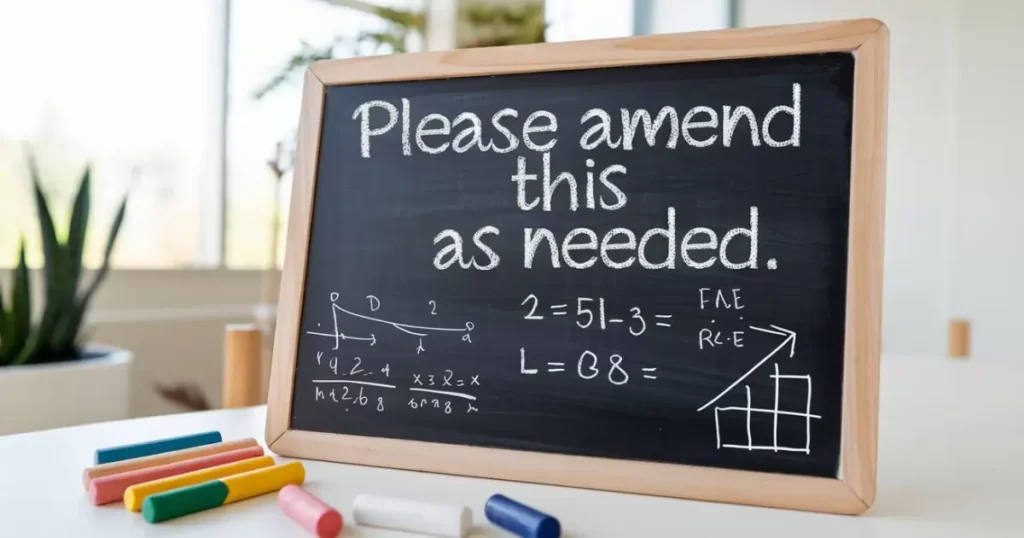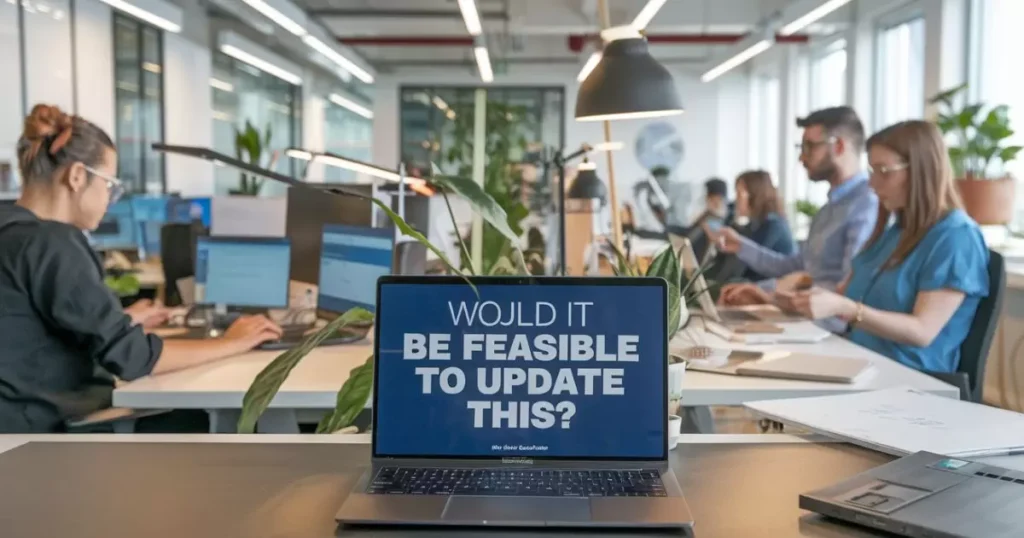Elevate your communication with these creative and polite ways to request changes. Discover phrases that add clarity and professionalism to your requests.
Requesting changes is a routine part of many interactions, but the way you phrase your request can make a significant difference. Whether you need to be polite, assertive, or collaborative, choosing the right words can enhance your communication.
This guide explores various alternatives to the standard “Can you make some changes?” to help you convey your needs more effectively and professionally.
1. “Could you please adjust this?”
Scenario: Polite request for modification
- Example 1:
Adam: “I noticed a few issues with the report.”
Daniel: “Could you please adjust this?“ - Example 2:
Adam: “The presentation needs some tweaks.”
Daniel: “Could you please adjust this?” Explanation: This phrase is polite and respectful, making it ideal for formal or professional contexts where a gentle request is appropriate.
2. “Can we make some revisions here?”
Scenario: Collaborative approach to changes
- Example 1:
Adam: “The draft isn’t quite right yet.”
Daniel: “Can we make some revisions here?“ - Example 2:
Adam: “This section needs improvement.”
Daniel: “Can we make some revisions here?” Explanation: This phrase fosters a sense of collaboration and teamwork, which can be effective when working on shared documents or projects.
3. “Would it be possible to modify this?”
Scenario: Formal and respectful request
- Example 1:
Adam: “I believe the design needs some changes.”
Daniel: “Would it be possible to modify this?“ - Example 2:
Adam: “This section requires some updates.”
Daniel: “Would it be possible to modify this?” Explanation: This phrase is formal and respectful, suitable for professional emails or formal requests where courtesy is important.
4. “Could you make these adjustments?”
Scenario: Direct and straightforward request
- Example 1:
Adam: “The specifications need to be altered.”
Daniel: “Could you make these adjustments?“ - Example 2:
Adam: “There are a few details that require change.”
Daniel: “Could you make these adjustments?” Explanation: This phrase is direct and clear, ideal for situations where you need to be straightforward about the changes required.
5. “Please amend this as needed.”

Scenario: Clear and precise instruction
- Example 1:
Adam: “The report needs some corrections.”
Daniel: “Please amend this as needed.“ - Example 2:
Adam: “Adjust the figures according to the latest data.”
Daniel: “Please amend this as needed.” Explanation: This phrase provides clear instructions for making necessary changes, suitable for detailed and specific requests.
6. “Can you update this accordingly?”
Scenario: Request for changes based on new information
- Example 1:
Adam: “We have new data that needs to be included.”
Daniel: “Can you update this accordingly?“ - Example 2:
Adam: “The requirements have changed slightly.”
Daniel: “Can you update this accordingly?” Explanation: This phrase is useful when changes are based on updated information or new requirements, ensuring that updates reflect the latest details.
7. “Would you mind making these changes?”
Scenario: Polite request with a touch of formality
- Example 1:
Adam: “The content needs some revisions.”
Daniel: “Would you mind making these changes?“ - Example 2:
Adam: “This section isn’t quite right.”
Daniel: “Would you mind making these changes?” Explanation: This phrase adds a polite touch to your request, making it suitable for situations where you want to be courteous.
8. “Please consider these modifications.”
Scenario: Suggestive approach to changes
- Example 1:
Adam: “The approach might benefit from a few tweaks.”
Daniel: “Please consider these modifications.“ - Example 2:
Adam: “The design could be improved with some adjustments.”
Daniel: “Please consider these modifications.” Explanation: This phrase is suggestive, giving the recipient the option to consider changes without being overly directive.
9. “I would appreciate it if you could revise this.”
Scenario: Formal request for revisions
- Example 1:
Adam: “There are some areas in the document that need changes.”
Daniel: “I would appreciate it if you could revise this.“ - Example 2:
Adam: “The proposal needs some alterations.”
Daniel: “I would appreciate it if you could revise this.” Explanation: This phrase is formal and expresses gratitude, making it suitable for professional contexts where appreciation is important.
10. “Could you please make these adjustments?”
Scenario: Detailed request for specific changes
- Example 1:
Adam: “The budget figures need to be updated.”
Daniel: “Could you please make these adjustments?“ - Example 2:
Adam: “The text requires some rephrasing.”
Daniel: “Could you please make these adjustments?” Explanation: This phrase is detailed and specific, making it suitable for requests that require precise modifications.
11. “Would you be able to make these changes?”
Scenario: Inquiry about feasibility of changes
- Example 1:
Adam: “We need to adjust the project timeline.”
Daniel: “Would you be able to make these changes?“ - Example 2:
Adam: “This part of the proposal needs updating.”
Daniel: “Would you be able to make these changes?” Explanation: This phrase inquires about the recipient’s ability to make changes, which can be helpful when discussing the feasibility of modifications.
12. “Please revise this as per the feedback.”
Scenario: Request for changes based on feedback
- Example 1:
Adam: “The draft needs to reflect the latest feedback.”
Daniel: “Please revise this as per the feedback.“ - Example 2:
Adam: “Incorporate the comments we discussed.”
Daniel: “Please revise this as per the feedback.” Explanation: This phrase directs the recipient to make changes based on specific feedback, ensuring that the revisions align with provided input.
13. “Can you adjust this according to the new guidelines?”
Scenario: Request for changes based on updated criteria
- Example 1:
Adam: “The project must meet the new standards.”
Daniel: “Can you adjust this according to the new guidelines?“ - Example 2:
Adam: “Update the report to reflect the revised criteria.”
Daniel: “Can you adjust this according to the new guidelines?” Explanation: This phrase is used when changes need to adhere to new or updated guidelines, ensuring compliance with the latest standards.
14. “Please modify this to better suit our needs.”
Scenario: Request for changes to improve suitability
- Example 1:
Adam: “The proposal needs to be more aligned with our objectives.”
Daniel: “Please modify this to better suit our needs.“ - Example 2:
Adam: “Adjust the plan to fit our requirements.”
Daniel: “Please modify this to better suit our needs.” Explanation: This phrase emphasizes improving the fit of the changes to better meet specific needs or objectives.
15. “Can you make the necessary changes?”
Scenario: General request for essential modifications
- Example 1:
Adam: “The document needs to be updated.”
Daniel: “Can you make the necessary changes?“ - Example 2:
Adam: “Adjust the figures as required.”
Daniel: “Can you make the necessary changes?” Explanation: This phrase is general and implies that changes are needed without specifying details, suitable for broad requests.
Other Ways to Say “Living in the Moment”
16. “Would it be possible to alter this?”
Scenario: Request for potential modifications
- Example 1:
Adam: “The contract terms need adjusting.”
Daniel: “Would it be possible to alter this?“ - Example 2:
Adam: “The schedule requires some changes.”
Daniel: “Would it be possible to alter this?” Explanation: This phrase is polite and inquires about the possibility of making changes, useful when discussing potential adjustments.
17. “Please consider these changes for improvement.”
Scenario: Suggestive request for enhancements
- Example 1:
Adam: “The design could be better with some updates.”
Daniel: “Please consider these changes for improvement.“ - Example 2:
Adam: “The text may benefit from a few revisions.”
Daniel: “Please consider these changes for improvement.” Explanation: This phrase suggests changes as a means of enhancement, offering a constructive approach to requesting modifications.
18. “Could you revise this according to our discussion?”
Scenario: Request for changes based on previous conversation
- Example 1:
Adam: “The document should reflect the points we covered.”
Daniel: “Could you revise this according to our discussion?“ - Example 2:
Adam: “Adjust the plan based on our recent meeting.”
Daniel: “Could you revise this according to our discussion?” Explanation: This phrase directs the recipient to make changes based on specific points discussed, ensuring alignment with prior conversations.
19. “Can you make these updates at your earliest convenience?”
Scenario: Request for timely updates
- Example 1:
Adam: “The report needs updating soon.”
Daniel: “Can you make these updates at your earliest convenience?“ - Example 2:
Adam: “Please adjust the schedule when you have a moment.”
Daniel: “Can you make these updates at your earliest convenience?” Explanation: This phrase requests changes while emphasizing the need for timely action, making it suitable for urgent or time-sensitive updates.
20. “Please address these issues as soon as possible.”
Scenario: Urgent request for resolution
- Example 1:
Adam: “The problems with the project need immediate attention.”
Daniel: “Please address these issues as soon as possible.“ - Example 2:
Adam: “Resolve the discrepancies quickly, if you can.”
Daniel: “Please address these issues as soon as possible.” Explanation: This phrase stresses the urgency of the request, ideal for situations where prompt action is required.
21. “Would you mind revising this accordingly?”
Scenario: Polite request for changes
- Example 1:
Adam: “The draft needs some adjustments.”
Daniel: “Would you mind revising this accordingly?“ - Example 2:
Adam: “The document should be updated based on feedback.”
Daniel: “Would you mind revising this accordingly?” Explanation: This phrase is polite and respectful, making it suitable for situations where you want to ask for changes in a considerate manner.
22. “Please update this to align with the latest requirements.”
Scenario: Request for compliance with new standards
- Example 1:
Adam: “The project needs to meet the new standards.”
Daniel: “Please update this to align with the latest requirements.“ - Example 2:
Adam: “Adjust the proposal to fit the new guidelines.”
Daniel: “Please update this to align with the latest requirements.” Explanation: This phrase ensures that changes are made to comply with the most recent requirements or standards.
23. “Could you please modify this as discussed?”
Scenario: Request for changes based on prior discussion
- Example 1:
Adam: “The document should reflect our last meeting.”
Daniel: “Could you please modify this as discussed?“ - Example 2:
Adam: “Adjust the plan according to our previous conversation.”
Daniel: “Could you please modify this as discussed?” Explanation: This phrase directs the recipient to make changes based on specific points discussed in prior interactions.
24. “Would it be feasible to update this?”

Scenario: Inquiry about the possibility of changes
- Example 1:
Adam: “The proposal might need some changes.”
Daniel: “Would it be feasible to update this?“ - Example 2:
Adam: “The report requires some revisions.”
Daniel: “Would it be feasible to update this?” Explanation: This phrase is used to inquire about the feasibility of making updates, which can be helpful when discussing potential changes.
25. “Please revise this to better meet our goals.”
Scenario: Request for alignment with objectives
- Example 1:
Adam: “The plan needs to better align with our objectives.”
Daniel: “Please revise this to better meet our goals.“ - Example 2:
Adam: “Adjust the proposal to fit our strategic goals.”
Daniel: “Please revise this to better meet our goals.” Explanation: This phrase emphasizes the need to make changes that align with specific goals or objectives, making it suitable for strategic adjustments.
26. “Can you alter this based on the new feedback?”
Scenario: Request for adjustments based on feedback
- Example 1:
Adam: “The document needs to incorporate recent feedback.”
Daniel: “Can you alter this based on the new feedback?“ - Example 2:
Adam: “Update the proposal with the latest suggestions.”
Daniel: “Can you alter this based on the new feedback?” Explanation: This phrase directs the recipient to make changes that reflect new feedback or suggestions.
27. “Would you be able to adjust this as needed?”
Scenario: Flexible request for modifications
- Example 1:
Adam: “The presentation needs some updates.”
Daniel: “Would you be able to adjust this as needed?“ - Example 2:
Adam: “The details require some tweaks.”
Daniel: “Would you be able to adjust this as needed?” Explanation: This phrase is flexible and allows the recipient to make necessary adjustments based on their judgment.
28. “Please make the necessary modifications.”
Scenario: Request for essential changes
- Example 1:
Adam: “The figures need to be corrected.”
Daniel: “Please make the necessary modifications.“ - Example 2:
Adam: “Adjust the content to fix the errors.”
Daniel: “Please make the necessary modifications.” Explanation: This phrase is straightforward and emphasizes the need for essential changes.
29. “Could you please update this document?”
Scenario: General request for document updates
- Example 1:
Adam: “The report needs to be current.”
Daniel: “Could you please update this document?“ - Example 2:
Adam: “The manuscript requires some changes.”
Daniel: “Could you please update this document?” Explanation: This phrase is used for general requests to update documents, making it suitable for a variety of contexts.
30. “Would you mind making these updates?”
Scenario: Polite request for updates
- Example 1:
Adam: “The schedule needs to be revised.”
Daniel: “Would you mind making these updates?“ - Example 2:
Adam: “The project details need some adjustments.”
Daniel: “Would you mind making these updates?” Explanation: This phrase is polite and respectful, suitable for requesting updates in a considerate manner.
Conclusion
Using varied phrases to request changes can enhance your communication by adding professionalism and clarity. Whether you’re being polite, assertive, or collaborative, these alternatives can help you convey your needs more effectively and make your requests stand out.
Choose the right expression to ensure your modifications are addressed appropriately and efficiently.

Hi! I’m Lauren Reynolds, the author of Grammar Glides. I create easy-to-follow content that helps you master English with confidence. Let’s make learning English simple and enjoyable together!

